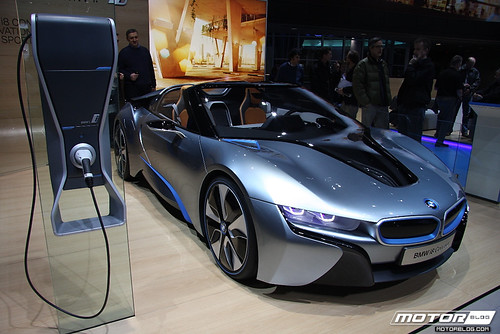Electric vs Gasoline Cars- Which is Better?
Are Electric Vehicles The Transportation of The Future?

Source: Momentimedia GmbH / TechFieber.
“Electric Cars at NAIAS 2013” by motorblog is marked with CC BY 2.0.
Pros of Gas Vehicles
Internal combustion engines (ICEs) have been around for more than a century and provide a comfortable driving experience. Gas-powered cars are simple to operate, fuel, and have a great driving range, making them ideal for extended road journeys. Many drivers find gas-powered automobiles appealing because of these benefits, as well as the cheaper initial costs of ownership. Gas engines have become more complicated throughout time and are today amazingly fuel efficient and powerful.
Cons of Gas Vehicles
Gas vehicles’ days are numbered, despite improvements in fuel economy and fewer exhaust emissions. The detrimental impact of humans on the globe and its environment significantly outweighs the benefits of gasoline automobiles, and automobile manufacturers are well aware of this. They are creating electric automobiles at a fast pace, and government incentives, such as tax credits, make purchasing an electric car an appealing possibility for many.
Electric Vehicles
Battery power isn’t a novel concept. Electric vehicles have been around for almost as long as gasoline-powered vehicles. Although batteries, charging, range, and a variety of other aspects have evolved dramatically over time, electricity has always been a part of the automobile psyche.
Concerns about the environment, gasoline prices, pollutants, and other considerations are pushing a growing number of people to purchase electric automobiles. According to recent studies, electric vehicles will exceed gas-powered vehicles in several countries by 2033, and globally just a few years later.
What Are The Pros of Owning an Electric Vehicle?
Reduced Maintenance
While gas vehicles are typically less expensive and easier to refuel, there are some advantages to owning an electric vehicle that have nothing to do with pricing. One of the most significant advantages of owning an electric vehicle is the reduced requirement for routine maintenance. There are no oil changes, no mechanical components to break under the hood, no exhaust system, and other components like brakes can have their lives extended. Because there is no engine noise, many people claim that driving an electric car is more soothing than driving a gas vehicle.
More Performance
Many electric cars outperform gas-powered automobiles in terms of performance. This is true not only for Porsche, Tesla, and other high-performance cars, but also for daily commuter vehicles. Depending on driving tendencies, the immediate torque and acceleration can make electric cars enjoyable to drive and faster than most people expect.
Tax Incentives
Depending on the electric vehicle you choose, you may be eligible for tax incentives. The federal government grants buyers of qualified electric cars a one-time tax credit of up to $7,500, and many states also offer tax credits on certain models, lowering the effective cost of the purchase.
All of this is without mentioning the complete elimination of greenhouse gas emissions in ordinary driving or the reality that petrol prices fluctuate significantly. For many consumers, the cost of gasoline is a major factor.
Related Stories:
https://www.caranddriver.com/research/a32781943/electric-cars-vs-gas-cars/
https://shift.com/articles/electric-vs-gas-cars-whats-the-real-difference-between-them
https://www.energysage.com/electric-vehicles/costs-and-benefits-evs/evs-vs-fossil-fuel-vehicles/
https://www.caranddriver.com/shopping-advice/a32494027/ev-vs-gas-cheaper-to-own/
https://insideevs.com/features/557987/ev-versus-gas-price-comparison/
Take Action:
Phone Number: 888-518-3752
https://twitter.com/elonmusk?ref_src=twsrc%5Etfw










